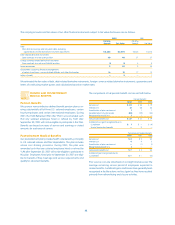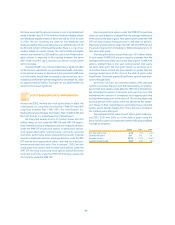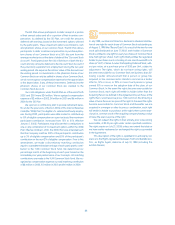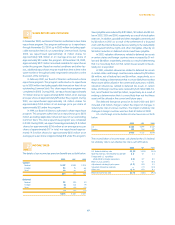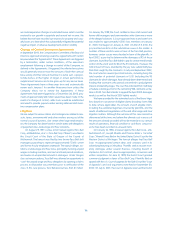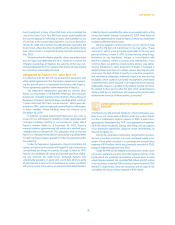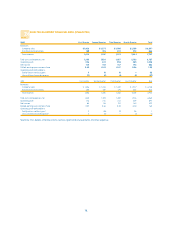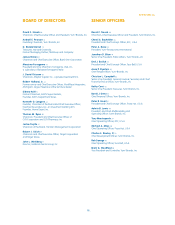Pizza Hut 2002 Annual Report Download - page 73
Download and view the complete annual report
Please find page 73 of the 2002 Pizza Hut annual report below. You can navigate through the pages in the report by either clicking on the pages listed below, or by using the keyword search tool below to find specific information within the annual report.
Court’s judgment in favor of Taco Bell Corp. and remanded the
case to the District Court. Taco Bell Corp. unsuccessfully petitioned
the Court of Appeals for rehearing en banc, and its petition for writ
of certiorari to the United States Supreme Court was denied on
January 21, 2002. The case has now officially been returned to the
District Court, where the Wrench plaintiffs will be allowed to bring
their claims to trial. It is expected that the trial will commence in
May 2003.
We believe that the Wrench plaintiffs’ claims are without merit
and are vigorously defending the case. However, in view of the
inherent uncertainties of litigation, the outcome of the case can-
not be predicted at this time. Likewise, the amount of any potential
loss cannot be reasonably estimated.
Obligations to PepsiCo, Inc. After Spin-off
In connection with the Spin-off, we entered into separation and
other related agreements (the “Separation Agreements”) govern-
ing the Spin-off and our subsequent relationship with PepsiCo.
These agreements provide certain indemnities to PepsiCo.
The Separation Agreements provided for, among other
things, our assumption of all liabilities relating to the restaurant
businesses, including California Pizza Kitchen, Chevys Mexican
Restaurant, D’Angelo’s Sandwich Shops, East Side Mario’s and Hot
’n Now (collectively the “Non-core Businesses”, which were dis-
posed of in 1997), and our indemnification of PepsiCo with respect
to these liabilities. These liabilities were not material as of
December 28, 2002.
In addition, we have indemnified PepsiCo for any costs or
losses it incurs with respect to all letters of credit, guarantees and
contingent liabilities relating to our businesses under which
PepsiCo remains liable. As of December 28, 2002, PepsiCo
remains liable for approximately $65 million on a nominal basis
related to these contingencies. This obligation ends at the time
PepsiCo is released, terminated or replaced by a qualified letter
of credit. We have not been required to make any payments under
this indemnity.
Under the Separation Agreements, PepsiCo maintains full
control and absolute discretion with regard to any combined or
consolidated tax filings for periods through October 6, 1997.
PepsiCo also maintains full control and absolute discretion regard-
ing any common tax audit issues. Although PepsiCo has
contractually agreed to, in good faith, use its best efforts to settle
all joint interests in any common audit issue on a basis consistent
with prior practice, there can be no assurance that determinations
made by PepsiCo would be the same as we would reach, acting
on our own behalf. Through December 28, 2002, there have not
been any determinations made by PepsiCo where we would have
reached a different determination.
We also agreed to certain restrictions on our actions to help
ensure that the Spin-off maintained its tax-free status. These
restrictions, which were generally applicable to the two-year
period following October 6, 1997, included among other things,
limitations on any liquidation, merger or consolidation with
another company, certain issuances and redemptions of our
Common Stock, our granting of stock options and our sale, refran-
chising, distribution or other disposition of assets. If we failed to
abide by these restrictions or to obtain waivers from PepsiCo and,
as a result, the Spin-off fails to qualify as a tax-free reorganiza-
tion, we may be obligated to indemnify PepsiCo for any resulting
tax liability, which could be substantial. No payments under these
indemnities have been required or are expected to be required.
Additionally, PepsiCo is entitled to the federal income tax bene-
fits related to the exercise after the Spin-off of vested PepsiCo
options held by our employees. We expense the payroll taxes
related to the exercise of these options as incurred.
AMERISERVE BANKRUPTCY REORGANIZATION
PROCESS
AmeriServe was the principal distributor of food and paper sup-
plies to our U.S. stores when it filed for protection under Chapter
11 of the U.S. Bankruptcy Code on January 31, 2000. A plan of reor-
ganization for AmeriServe (the “POR”) was approved on November
28, 2000, which resulted in, among other things, the assumption
of our distribution agreement, subject to certain amendments, by
McLane Company, Inc.
During the AmeriServe bankruptcy reorganization process,
we took a number of actions to ensure continued supply to our
system. Those actions resulted in a cumulative net unusual items
expense of $110 million, which was principally recorded in 2000,
being recorded through year-end 2002.
Under the POR we are entitled to proceeds from certain resid-
ual assets, preference claims and other legal recoveries of the
estate which are generally recorded as unusual items income
when they are realized. We recorded $39 million and $21 million
of net recoveries under the POR as unusual items income in 2002
and 2001, respectively. These net recoveries are included in the
cumulative net unusual items expense of $110 million.
NOTE
25
71.
Yum! Brands Inc.



